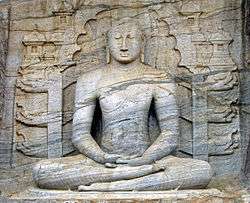Parivara
| Part of a series on |
| Theravāda Buddhism |
|---|
 |
| Pāli Canon |
|---|
| Vinaya Pitaka |
| Sutta Pitaka |
| Abhidhamma Pitaka |
it is also called as parivarapatha
Parivara (Pali for "accessory") is the third and last book of the Theravadin Vinaya Pitaka. It includes a summary and multiple analyses of the various rules identified in the Vinaya Pitaka's first two books, the Suttavibhanga and the Khandhaka, primarily for didactic purposes. As it includes a long list of teachers in Ceylon, even Theravada fundamentalists recognize that, at least in its present form, it is of late date. Scholars give it a late date, some suggesting it may be even later than the Fourth Council in Ceylon in the last century BCE, at which the Pali Canon was written down from oral tradition.[1]
Translation: The Book of the Discipline, tr I. B. Horner, volume VI, 1966, Pali Text Society, Lancaster
The book is in 19 chapters:
- catechisms on the rules of the monks' Patimokkha
- similar on the nuns' rules
- verse summary of origins; an action can be originated by body and/or speech, in each of the three cases with or without intention, making six origins in all; this chapter goes through all the Patimokkha rules for monks and nuns, saying which of these six are possible
- in two parts:
- repetitions on types of legal case involved in offences
- which rules for settling disputes are to be applied to legal cases
- questions on Khandhaka
- lists arranged numerically (cf. Anguttara Nikaya)
- in two parts:
- beginning the recitation of the Patimokkha
- exposition of reasons for rules
- collection of stanzas
- on legal cases
- additional collection of stanzas (mainly on reproving)
- on reproving
- lesser collection on disputes
- greater collection on disputes
- kathina: the process of making up robes
- Upali asks the Buddha questions, the answers being lists of five
- another chapter on origins
- second (sic) collection of stanzas
- "sweat-inducing stanzas": a collection of riddles (answers not given here); perhaps intended as exam questions"
- in five parts:
- formal acts of the sangha
- reasons for rules
- laying down of rules
- what was laid down
- nine classifications
See also
Notes
- ↑ This work (the Parivara) is in fact a very much later composition, and probably the work of a Ceylonese Thera. from: Book of the Discipline, volume VI, page ix (translators' introduction)